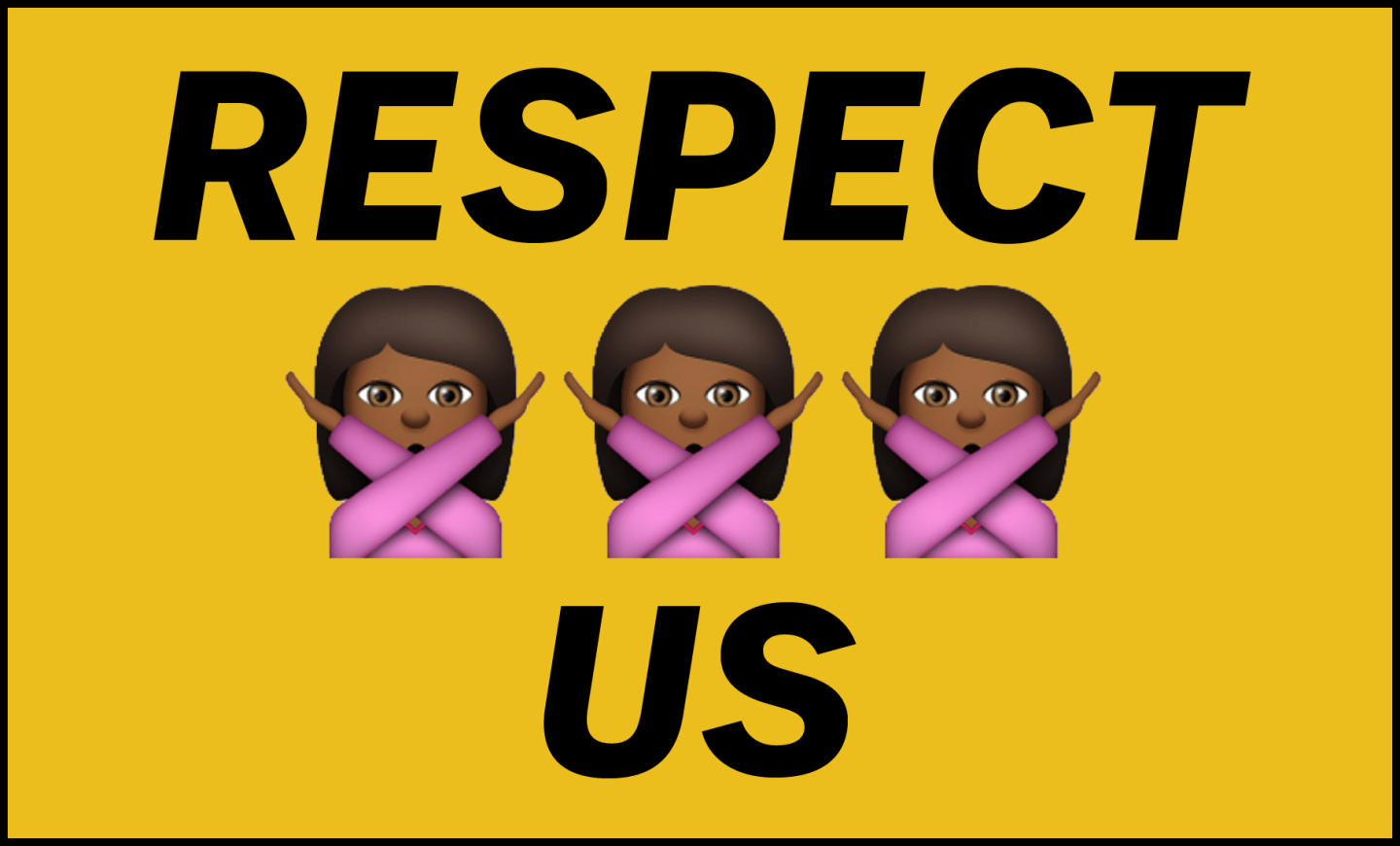 Illustration by Leah Mandel
Illustration by Leah Mandel
The unrelenting fight against anti-blackness and misogyny is exhausting. In 2010, queer black feminist Moya Bailey created the term “misogynoir” to speak specifically to the unique misogyny that black women routinely experience. In rap and hip-hop culture at large, misogynoir manifests in a variety of ways, from the erasure of black women in music videos to male artists not being held accountable for violence and abuse against us. In addition to demeaning treatment from men, white women adjacent to the culture — who are often praised in spite of their mediocrity — bring their privilege to the space, at once disrespecting and leeching from the contributions of black women.
FADER staffers Juliana Pache and Lakin Starling discussed the ways in which such behaviors are supported on the internet and in real life, and the harm they ultimately cause to black women.
Juliana Pache: The world treats black women as a resource. A lot of us know that the world will only value us if we are producing something, which probably contributes to why we work so hard. We go above and beyond in everything that we do. I personally do not know a single black woman that doesn’t work hard. We just know that we have to work harder than anyone else.
Women like Miley Cyrus and YesJulz — white women that enter black spaces and appropriate blackness — gain visibility and profit almost immediately. But it’s bigger than Miley Cyrus, Taylor Swift, and YesJulz, because they represent so many of the violent white women we encounter in our lives: white women who throw stones then hide their hands, white women who gaslight us, and use their privilege to disregard our valid criticisms. Knowing that black women are often not valued for our voices, is it even worth calling these women out? Are they even listening to us?
Lakin Starling: I forget to give myself credit a lot. I have to stop myself from obsessing about how good of a job I’m doing because I’m subconsciously paranoid about not doing enough because of this feeling that I have to go above and beyond as a black woman. It’s mind-blowing that as a gifted and very hard-working black woman, it’s difficult to land a position in the music industry — one that is built off black culture. I can mostly count on being outnumbered by white women and men in most professional rooms. Last night, I was on the phone with my best friend and I said to her, “I’ll be a black woman until the day I die, so how could I not use my voice to call out appropriators, racists, misogynoir, and disrespectful white women?” If we stay silent, we continue to be repressed while they continue to milk us mentally, spiritually, and culturally.
It’s hard because I get upset that I’ve spent so much time ranting about white women who steal from us and then acting like we don’t exist or men who hate women on Twitter, or venting to my friends, which makes me feel like I’ve given these people the power to consume so much of my thoughts and conversation. Sometimes self-preservation wins and I choose what I can and can't give my energy to, but we can’t afford to let people off the hook. It’s about the individual as well as the bigger picture of how anti-black behavior represents what we go through in the world outside of the microcosm of rap culture. No one should go unchecked. You disrespect us and call us out of our names on social media, you should absolutely be dragged down my timeline all day long. Then we’ll see if that same audacity shows up when your back is up against the wall. After the whole YesJulz debacle last Friday, I was super drained.
These tweets of yours resonated with me: “when she came for black women, nothing happened. when she came for poor black kids, nothing happened” and “then she came for niggas in general, and is finally being dragged.” It’s like we’re constantly being ignored up until the very last minute and even then, it’s like white folks are quickly forgiven and get a pass. Juliana, do you feel a lack of protection from all around?
“The reason so many of us pay attention and make noise about people like YesJulz is because we know we have to navigate a world that will give problematic, culture vulture white women a platform while silencing us.”
Juliana: Let’s actually talk about YesJulz for a second. She represents so much of why black women resent white women of her nature. It’s a very common theme: white woman with a fat ass creates a platform, white woman uses black girl aesthetics to promote her “brand,” white woman demonizes and gaslights black women who are “jealous” of her, white woman cries when she gets called out, white woman feels no remorse. I think because we see this happen so often, we’re fascinated by it. It’s so blatantly fucked up, and we know it’ll continue to happen.
What’s interesting to me about people like YesJulz and Miley Cyrus is, the culture embraces them. YesJulz once went on a Twitter rant (it’s since been deleted) about the kinds of resources black kids in the hood have. As if … she would … know that. As if she were some sort of urban sociologist. Miley Cyrus wanted to do hip-hop and everybody hopped on her bandwagon. Now, as she noted in an interview from early May, she’s no longer interested in “misogynistic” rap and is back to doing country. These women don’t understand the culture, and they don’t respect it. Stop cutting checks with these vultures.
This is true for me, and it may be for many black women, but I think the reason so many of us pay attention and make noise about people like YesJulz is because we know we have to navigate a world that will give problematic, culture vulture white women a platform while silencing us. I think it’s a part of our survival, examining the way privilege and power shows up in the industry and popular culture in general. Calling out the bullshit, I think, is important. It is draining, though. But I’ll probably make noise until I’m dead. Do you ever feel like black women are just talking to ourselves, and no one else is really even listening to us? Black women face a lot of violence, not just from white women, but men in general. Does it ever feel like we’re just fighting everyone? Like all we have are our sisters?
Lakin: White women like YesJulz think that having sex with black men grants them privilege and authority in our culture. That’s wrong — black penis doesn't magically get them any closer to blackness or give them protection from black people, specifically black women. The word “nigga” is still not theirs.
Our “noise” is not us complaining. It’s the undying chorus to our survival. I feel unheard all the time, but I’m also comforted by sister circles who pour into me. I rely on the women in my life so much. I also have a core group of men in my life who aren’t trash and ask questions, listen, and step up to defend and advocate for black women. But sometimes I feel like I’m suffocating because attacks on my blackness and gender hit me from all directions. I’ve been angry for the past fews days because black women pour so much into the world, unrequitedly. A very overwhelming misogyny still permeates rap culture. It explains why a recent music festival had 49 male artists on the line-up, and only three women.
Rappers are charged with sexual crimes and violence against women, and the industry continues to cut them checks, fanbases grow and judges are lenient with sentencing. It’s almost as if the more wrong you do to women, the larger your fame becomes. Other rappers carry out hashtags that advocate for the freedom of their peers, and unabashedly co-sign one another on stage. I’m still working through my rage about all of this. Do you ever feel conflicted as a person who pours into rap through your work? What do you think the men in that space need to understand about misogynoir and hold each other accountable for?
“Our ‘noise’ is not us complaining. It’s the undying chorus to our survival.”
Juliana: For starters, men need to just stop talking. Just stop talking, and absorb what women, specifically black women, are telling you about the way we’re being treated. This is true for all people who have some form of privilege, and most of us do. If a trans person is speaking about their experience, I — a cis person — am shutting the fuck up. It’s a beautiful thing; there is a whole lot to learn when you just shut the fuck up.
The men in this space, and in every space, could practice a lot more self-reflection. For example, if we say “men are trash,” what we’re really saying is, “You are actively creating and/or supporting an environment that is harmful and violent towards women, and you are doing nothing about it, therefore you are trash.”
Non-trash men have a certain level of self-awareness. They can say to themselves, “Damn, am I trash? What traits do I have that can be interpreted as ‘trash?’ Do I do ‘trash’ things? Am I harmful to others? How can I do better?” My boyfriend sees my tweets, and hears me vent about how trash men are, and he’s been very self-aware in response. I can tell that he wonders if he’s trash, which is exactly why he’s not: because he self-reflects and seeks feedback from others. Music and entertainment are male-dominated spaces. What kind of support do you think black women need in music/entertainment, and how can men be a part of that support?
Lakin: In addition to being listened to, it’s important that we are even in the room at all. Often a decision is made without no thought on how it can and will impact women. When male artists degrade and violate women, we must hold them accountable. There’s a blatant disregard for verbal, physical, and sexual violence against women and we can’t accept that it’s simply a part of the terrain. That dismissal creates a community of young women who are afraid to speak out for fear of intense harassment online and/or lenient punishment for their abuser. Stop booking these artists.
Rappers have been contributing to the hateful and self-loathing “bitches ain’t shit” narrative in rap culture for over 25 years, and black women have been at the brunt of that rhetoric. I’ve stopped watching a lot of music videos because I can only imagine the criteria for casting. We see that the black woman’s body is the template for the standard, but using mostly white and racially ambiguous women with those features doesn’t celebrate or acknowledge our blackness. Men — specifically black men if you don’t uplift or align yourself with black women except for when it’s time to sexualize them — you’re problematic and that type of behavior is hurtful. If you’re only going to remember and include us when it’s time to debase and disrespect us, then just leave us alone.
